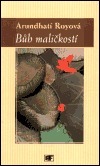Take a photo of a barcode or cover
adventurous
challenging
emotional
funny
mysterious
sad
medium-paced
Plot or Character Driven:
Character
Strong character development:
Yes
Loveable characters:
Yes
Diverse cast of characters:
Yes
Flaws of characters a main focus:
Yes
Graphic: Child abuse, Incest
The God of Small Things isn’t just a simple family drama. Arundhati Roy dives deep into the darker sides of India, from caste discrimination to patriarchy and social hypocrisy. Here, you can see how a rigid social system can completely destroy someone’s life just because they broke the “rules” set by society. In terms of writing, Roy is brilliant at weaving social criticism into a story that jumps back and forth in time yet still feels connected. The Kerala setting feels alive, but the atmosphere is heavy and tense. What really hits is the main message—sometimes the smallest, seemingly trivial things can have huge, irreversible consequences. This isn’t exactly a light read, but it’s absolutely worth it if you want to see how personal wounds and social wounds can intertwine and slowly tear everything apart.
dark
emotional
sad
slow-paced
Plot or Character Driven:
Plot
adventurous
dark
emotional
sad
tense
slow-paced
Plot or Character Driven:
A mix
Strong character development:
Complicated
Loveable characters:
Yes
Diverse cast of characters:
Yes
Flaws of characters a main focus:
Yes
challenging
dark
mysterious
sad
medium-paced
Plot or Character Driven:
A mix
Strong character development:
Yes
Loveable characters:
Yes
Diverse cast of characters:
Yes
Flaws of characters a main focus:
Yes
dark
emotional
reflective
sad
medium-paced
Arundhati Roy’s The God of Small Things is about fine lines between love, pain, joy, madness, jealousy, hierarchy, human intent and nature. It shows the intricacies of familial love, set against the lush, politically charged landscape of Kerala, India. This novel, Roy’s debut, 1997 Booker Prize winner is a blend of emotional depth and innovative narration.
The story is set in Ayemenem, Kerala, with a disjointed narrative shifting between 1969 and 1993. Estha and Rahel are fraternal twins whose lives are irrevocably altered by a hostile political climate, love laws, a family tragedy, and a series of ‘small things’ that collide to alter the course of their lives.
In this novel, Roy criticises the rigid social hierarchies and moral codes that govern Indian society, and the destructive power of these structures through the tragic love affair between Ammu, the twins' mother, and Velutha, an Untouchable. Their doomed relationship highlights the brutality of the caste system and how it perpetuates inequality and suffering.
The portrayal of lush Kerala landscape, monsoon, and communism, mirror complexities of human emotions with lyrical prose, jumps between periods, rich with imagery and symbolism advocates Roy as a powerful voice in contemporary literature. Though, in some places, the book was criticised especially for its unrestrained description of sexuality and obscenity.
The story is tragic, but it never promises to be anything else. Sadness and loss weave through the story right from the start. It’s not for everyone. If you are a literary enthusiast, or you enjoy dense flowery writing, or you like to experience different cultures through books, this will be worth your while.
The story is set in Ayemenem, Kerala, with a disjointed narrative shifting between 1969 and 1993. Estha and Rahel are fraternal twins whose lives are irrevocably altered by a hostile political climate, love laws, a family tragedy, and a series of ‘small things’ that collide to alter the course of their lives.
In this novel, Roy criticises the rigid social hierarchies and moral codes that govern Indian society, and the destructive power of these structures through the tragic love affair between Ammu, the twins' mother, and Velutha, an Untouchable. Their doomed relationship highlights the brutality of the caste system and how it perpetuates inequality and suffering.
The portrayal of lush Kerala landscape, monsoon, and communism, mirror complexities of human emotions with lyrical prose, jumps between periods, rich with imagery and symbolism advocates Roy as a powerful voice in contemporary literature. Though, in some places, the book was criticised especially for its unrestrained description of sexuality and obscenity.
The story is tragic, but it never promises to be anything else. Sadness and loss weave through the story right from the start. It’s not for everyone. If you are a literary enthusiast, or you enjoy dense flowery writing, or you like to experience different cultures through books, this will be worth your while.
challenging
emotional
mysterious
reflective
medium-paced
Plot or Character Driven:
A mix
Strong character development:
Yes
Loveable characters:
Complicated
Diverse cast of characters:
Yes
Flaws of characters a main focus:
Yes
challenging
dark
emotional
informative
reflective
sad
tense
slow-paced
Plot or Character Driven:
A mix
Strong character development:
Complicated
Loveable characters:
Complicated
Diverse cast of characters:
Yes
Flaws of characters a main focus:
Yes
Graphic: Child death, Death, Domestic abuse, Emotional abuse, Incest, Mental illness, Misogyny, Physical abuse, Racism, Sexual content, Violence, Xenophobia, Blood, Excrement, Vomit, Police brutality, Grief, Religious bigotry, Death of parent, Injury/Injury detail
reflective
sad
tense
medium-paced
Plot or Character Driven:
Character
Strong character development:
No
Loveable characters:
Complicated
Diverse cast of characters:
No
Flaws of characters a main focus:
N/A



